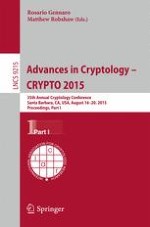2015 | OriginalPaper | Chapter
Indistinguishability Obfuscation from Compact Functional Encryption
Authors : Prabhanjan Ananth, Abhishek Jain
Published in: Advances in Cryptology -- CRYPTO 2015
Publisher: Springer Berlin Heidelberg
Activate our intelligent search to find suitable subject content or patents.
Select sections of text to find matching patents with Artificial Intelligence. powered by
Select sections of text to find additional relevant content using AI-assisted search. powered by
